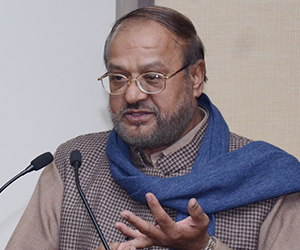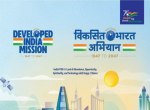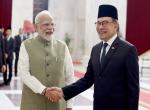Among the political parties, who treat Muslims as a vote-bank, the clamour for the reservations for Muslims is increasing every day. Every time elections, be it of a State Assembly or the Parliament, approach the pitch for reservation for Muslims increases. Recently held Assembly election in Uttar Pradesh which has sizable presence of Muslims population, is an example. Various political parties promised from 9% reservations 18% reservations for the Muslims in Government jobs and educational institutions. It is ironical that Prime Minister of India should declare from the Rampart of the Lal Qila on 15th August 2007 that “Muslims have the first right on the resources of the country.” This is the mental makeup of the Prime Minister and the largest political party which claims the legacy of the Freedom movement, then what can be said about smaller leaders and the parties. The Congress leaders, freedom fighters, the Constituent Assembly and Jawaharlal Nehru had given enough thought on the issue and felt that reservation of any kind will be detrimental for the development of the nation and a cohesive society.
These leaders often quote Justice Ranganath Mishra Commission and Justice Sachar Committee Reports for such reservations for Muslims. This is despite the fact that Muslims are enjoying the benefits of reservation having been included in various states lists for the OBC/BC/SC and ST; despite the fact that Islam or Christianity denies existence of caste system within its fold.
Several times in the past separate reservations enacted in the name of religious denominations have been struck down by courts and the latest is the judgement delivered by Andhra Pradesh High Court declaring 4.5% sub-quota for the Muslims within 27% quota for the OBCs as unconstitutional. Predictably, the Central Government appealed for a stay of Andhra Pradesh High Court’s judgement. After hearing the matter argued by the Attorney General of India the Hon’ble Supreme Court declined to stay Andhra Pradesh High Court’s judgement and indeed made indicting comments on the Government that there is no rationale and justification for 4.5% sub-reservation for the Muslims within the 27% quota for the OBCs. . The Supreme Court criticized the government for the way it had handled the "complex" and "sensitive" issue. The apex court had also expressed its "unhappiness" that the Centre was blaming the High Court when it had itself failed to produce documents to support its case.
Justice Ranganath Mishra Commission
A ‘National Commission for Religious and Linguistic Minorities’ was set up by the Government of India in October 2004 under the Chairmanship of Justice Ranganath Mishra t. Other members were Prof. Tahir Mahmood (Muslim), Dr. Anil Wilson (Christian), Dr. Mohinder Singh (Sikh) and Mrs. Asha Das (SC and a former IAS officer) as Member Secretary. The Commission submitted its report in May 2007.
The terms of reference of the Commission were:
- To suggest criteria for identification of socially and economically backward sections among religious and linguistic minorities;
- To recommend measures for welfare of socially and economically backward sections and among religious and linguistic minorities, including reservation in education and government employment; and
- To suggest necessary constitutional, legal and administrative modalities required for the implementation of its recommendations.
However, subsequently following point was also added to the above terms of reference:
“To give its recommendations on the issues raised in writ petitions 189/04 and 94/05 filed in Supreme Court and in certain High Courts, relating to para 3 of the Constitution (Scheduled Castes) Order 1950 in the context of ceiling of 50 per cent on reservations as also the modalities of inclusion in the list of scheduled Castes.”
The Commission lists following communities as recognized minorities: Muslims, Christians, Sikhs, Buddhists, Jains and Parsi. Accepting the Hon’ble Supreme Court Judgement in TMA Pai Foundations and others Vs State of Karnataka and others the Commission says that “for the purpose of Article 30 a minority, whether linguistic or religious, is determinable with reference to a state and not by taking into consideration the population of the country as a whole.”
The Commission took the trouble of going through the economic, education and employment opportunities for all the people of India on the basis of religious denominations and to its dismay it found that by-and-large no substantial gaps exists among the various communities/religious groups – be it Hindus, Muslims or Christians. They are all suffering same level of disadvantages or having almost the same level of opportunities. In fact, in many aspects minorities and especially Muslims and Christians are doing much better. After discussing various issues like education, poverty, employment opportunities, caste and social status, and the various measures undertaken for the upliftment of disadvantaged groups, the Commission expresses it complete disillusionment with the existing system of reservation. It concluded as follows:
- The inclusion of an entire caste, tribe or class in the list, is contrary to the principle of social justice. No 'caste’, or class or tribe suffer from social, economic and educational deprivations as a whole. Class or caste or tribe as a criterion identifying the socio-economic backward has become totally irrelevant. The only option is to identify families that are socially and economically backward and devise criteria that are implementable. (Chapter 6, para 40),
- The lack of a system to regularly assess the impact on castes, tribes or classes enlisted of schemes and programme under implementation, to exclude categories either wrongly included in the list or no longer being eligible, has further complicated the situation. Non-exclusion of the ineligible has marginalised the poorest and most backward amongst various categories including the minorities. (Chapter 6, Para 41)
- Religion or castes do not determine 'socio-economic backwardness. Poverty is not religion or caste based and the socially, economically backward should be identified on uniformity applicable criterion throughout the country irrespective of caste, creed / religion affirmatives’. (Chapter 6, Para 42)
- The poorest of the poor families should get opportunities for advancement. Those falling in the creamy layer category should be excluded from the lists of backwards. Family-wise data should be collected and treated as valid for at least ten years and renewed periodically. Benefits of reservations should be made time-bound and for one generation only. (Chapter 6, Para 45 to 49)
- All lists (SC/ST/OBC) have been prepared without any scientific basis (no data base as no surveys were undertaken). (Chapter 6, para 65)
- Since BPL (below poverty line) lists are prepared on the basis of social/educational and economic criteria, they are more scientific. They are also revised periodically. BPL lists should, therefore, be made eligible for grant of reservation without distinction on caste, class, groups or religion basis.” (Chapter 10, Para13)
However, all good intension end here. When it came for suggesting concrete steps for a fair reservation system Commission not only failed in recommending any such measure but also to make the matter worse it jumped into the same rotten system, for the inclusion of Minorities also in the categories of OBC/BC/SC/ST. The recommendations read like a charter of demands on behalf of Muslims rather than a Commission’s report on all religious and linguistic minorities of India which also include Christians, Buddhists, Sikhs, and Zoroastrians and so on. It says:
“We recommend that in the matter of criteria for identifying backward classes there should be absolutely no discrimination whatsoever between the majority community and the minorities; and, therefore, the criteria now applied for this purpose to the majority community whatever that criteria may be - must be unreservedly applied also to all the minorities…. “To be more specific we recommend that all those social and vocational groups among the minorities who but for their religious identity would have been covered by the present net of Scheduled Castes should be unquestionably treated as socially backward, irrespective of whether the religion of those other communities recognises the caste system or not…. that the caste system should be recognised as a general social characteristic of the Indian society as a whole, without questioning whether the philosophy and teachings of any particular religion recognise it or not… (Chapter 10, Paras 5-16)
Unbelievable, as it may sound, the Commission Members totally forgot that reservations for SC/ST come into force because of the peculiar social-system and religious practices of Hindu society. They forget that it is this cast system for which Hindu society is constantly berated at political, intellectual, social, religious and academic platforms. Can the Islam and Christianity accept that in their social and religious practices they are same as their fellow Hindus? Are they willing to accept that caste system exists in the Islam and Christianity as a part of religious and social tenets?
The Member-Secretary very rightly questioned the wisdom of the Commission regarding the existence of caste system in the Islam and Christianity and submitted a 13 pages Note of Dissent. The Commission had no cogent reply to this note of dissent.
Sachar Committee Report
Justice Ranganath Mishra Commission report perhaps fell short of Government’s expectations, at least from the point of view of enhancing Muslims’ tilt toward the Congress. The Government of the day started looking for some other avenues for catering to the Muslims alone. Justice Rajinder Sachar Committee, appointed on 9th March 2005, filled this space. What was missing in the report of Mishra Commision, Sachar Committee compensated that in ample – reservation in the legislature and elected/political bodies.
Sachar Committee was ostensibly appointed by the UPA Government to look into the matters concerning “Social, Economic and Educational Status of the Muslim Community”. The subject matter itself shows as if the social, economic and educational problems in the other communities and among the followers of other religions in India do not exist. If that is not the case, then it can be safely said that even if the social, economic and educational problems do exist in other communities and amongst the followers of other religions in India, they do not merit any attention because they do not form a vote-bank or they do not form a “very strong, well knit and well-organized minority… that could force the partition of the country.”1 Be it as it may.
However, while going through Sachar Committee report, one can see that it is not only full of inaccurate data but also in many areas it dwells in the realm of fantasy. A large number of problems and deprivations that are being faced by most of the Indians, irrespective of caste, creed and religion, have been presented as those of Muslims’ alone. Many of the problems discussed in the report have nothing to do with the polity, government and the economic condition. They emanate directly from the social customs and the religious beliefs. It is impossible to believe that Justice Sachar and his learned colleagues are unaware of this aspect of the problem. They have simply ignored it. The entire report reads like compilation of reasonable and unreasonable complaints, grievances and demands of Muslims since independence.
One can reasonably expect that many people will continue to discuss various aspects of this report for sometimes to come. Our purpose is limited; only to discuss the insinuating statement concerning the ‘political participation of the Muslims’ and the recommendations that the report has made in the matter. The notification of the Government of India certainly had not mandated the Committee to go into political matters. But it still has gone into it. What is most shocking is that it has suggested the very same remedy which was based on two-nation theory that finally led to the unprecedented human miseries, both for the Hindus and Muslims, and partition of the country. The Committee has recommended reservations in the legislature and in the other elected bodies besides having reservations in the services, educational institutions and public and private sectors.
These recommendations though discussed and contained in just two paragraphs of the report, become significant in the light of explanations given by Abusaleh Shariff, Member Secretary in the Sachar Committee. Mr. Shariff writes:
“It is a cruel irony that the development process by passed in particular Muslims who stayed back in India after the partition – those from Uttar Pradesh, Bihar and West Bengal.
The root cause of this neglect is lack of political empowerment. While the Constitution and the democratic framework allowed Muslims to maintain their identity and profess their faith, their representation in political system has suffered. This impacted their participation in governance.”
After this the Mr. Shariff talks about the population ratio in terms of Muslims belonging to the OBC, SC and ST categories. This is nothing less than a revelation that among the Muslims there exists caste system which discriminated them socially within the realm of Islam. Mr. Shariff now gives the solution of the problem:
“However, problems of Muslim deprivation cannot be addressed adequately through extension and implementation of reservations alone. OBC reservations apply only to public employment and now at higher levels of education. With the report detailing the nature of discrimination against Muslim, the challenge before Government, political class, private sector and civil society is to create institutional mechanism t ensure the delivery of essential public goods.
“To begin with, Muslims should be represented in political bodies, policy-making agencies, administration and law-enforcement agencies in relation to their share in the population.”
Reservation and the Constituent Assembly
The question of reservation in the services and in the elected bodies for the religious minorities was considered and discussed in detail by the Constituent Assembly. It constituted an Advisory Committee of 43 eminent political and religious leaders and social workers. The Committee was headed by was Shri S.C. Mookerjee, a Christian. Some of the Members were Maulana Abul Kalam Azad, Khan Abdul Samad Khan, Hifzur Rehman, Syed Ali Zaheer, Abdul Quiyum Ansari, Chaudhari Khaliquzzam, Saiyid Jafar Imam, Haji Abdul Sathar, Haji Isaq Seth. Jawaharlal Nehru, and Sardar Patel, Rajendra Prasad and B.R. Ambedakar (for the speeches of some of the leaders see earlier article on reservation on VIF web site - Reservation Based on Religion is Anti-Constitution).
However, the recommendations of the Advisory Committee were taken up for the discussion in the Constituent Assembly on 27 and 28 August 1948 and then again for two days, 25 and 26 May 1949. While submitting its recommendations to the Constituent Assembly the Committee reported:
“The Committee considering the whole situation came to the conclusion that the time has come, when the vast majority of the minority communities have themselves realised after great reflection the evil effects in the past of such reservation on the minorities themselves, that the reservations should be dropped.”
The recommendations as adopted by the Assembly were included in the Draft Constitution. In nutshell the committee recommended that:
“It was no longer appropriate in the context of free India and of present conditions that there should be reservation of seats for Muslims, Christians, Sikhs or any other religious minority. Although the abolition of separate electorates had removed much of the poison from the body politic, the reservation of seats for religious communities, it was felt, did lead to a certain degree of separatism and was to that extent contrary to the conception of secular democratic State."
On the issue of reservation in public services it was recommended that there shall be no reservation in the public services and competitive services except for the Scheduled Castes and Scheduled Tribes.
The Constituent Assembly debates (Vol. V) on the issue of religion based reservation is an eye opener. Most of the Muslim leaders like Z.H. Lari, Naziruddin Ahmad, Begum Aizaz Rasul, Muhammad Ismail Khan, Tajmul Hussain, Maulan Hasrat Mohani, and Col. B.H. Zaidi, who spoke on the occasion said in one voice that reservation on the basis of religion has been responsible for the division of country and is certainly an evil. They opposed any kind of reservation for Muslims just because they happen to be Muslims and have been enjoying reservation since 1906.
Jawaharlal Nehru speaking on 26th May 1949 in the Constituent Assembly on the issue of reservation based on religion said:
“Where you are up against a full- blooded democracy, if you seek to give safeguards to minority, and a relatively small minority, you isolate it. May be you protect it to a slight extent, but at what cost? At the cost of isolating it and keeping it away from the main current in which the majority is going, – I am talking on the political plane of course – at the cost of forfeiting that inner sympathy and fellow-feeling with the majority. … It is a bad thing for any small group or minority to make it appear to the world and to the majority that "we wish to keep apart from you, that we do not trust you, that we look to ourselves and that therefore we want safeguards and other things". The result is that they may get one anna in the rupee of protection at the cost of the remaining fifteen annas.”
Later, on the issue of any kind of reservations in general Jawaharlal Nehru wrote to all the Chief Ministers on 27 June 1961:
“I have referred above to efficiency and to our getting out of our traditional ruts. This necessitates our getting out of the old habits of reservations and particular privileges being given to this caste or that group. The recent meeting we held here, at which the Chief Ministers were present, to consider national integration, laid down that help should be given on economic considerations and not on caste. It is true that we are tied up with certain rules and conventions about helping the scheduled castes and tribes. They deserve help but, even so I dislike any kind of reservation, more particularly in Services. I react strongly against anything which leads to inefficiency and second-rate standards. I want my country to be a first class country in everything. The moment we encourage the second-rate, we are lost.
“The only real way to help a backward group is to give opportunities of good education; this includes technical education which is becoming more and more important. Everything else is provision of some kind of crutches which do not add to the strength or health of the body. We have made recently two decisions which are very important: one is, universal free elementary education, that is the base; and the second is scholarships on a very wide scale at every grade of education to the bright boys and girls, and this applies not merely to the literary education, but, much more so, to technical, scientific and medical training. I lay stress on the bright and able boys and girls because it is only they who will raise our standards. I have no doubt that there is a vast reservoir of potential talent in this country if only we can give it opportunity.
“But if we go in for reservations on communal and caste basis, we swamp the bright and able people and remain second-rate or third-rate. I am grieved to learn how far this business of reservation has gone based on communal considerations. It has amazed me to learn that even promotions are based some times on communal or caste considerations. This way lays not only folly, but disaster. Let us help the backward groups by all means, but never at the cost of efficiency. How are we going to build the public sector or indeed any sector with second rate-people?”
For Part I Click here : (Reservation Based on Religion is Anti-Constitution)
Published Date: 26th July 2012










Nice article. Thank u so much for sharing with us.
Thank u so much for sharing with us.
http://edu.fliqi.com/himachal-pradesh-govt-jobs
Post new comment